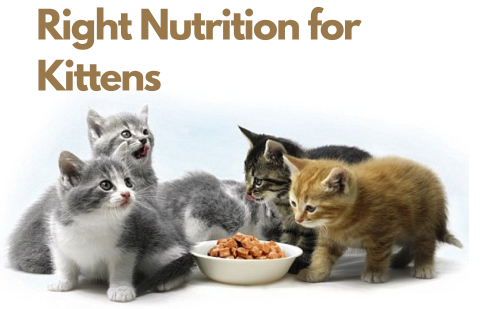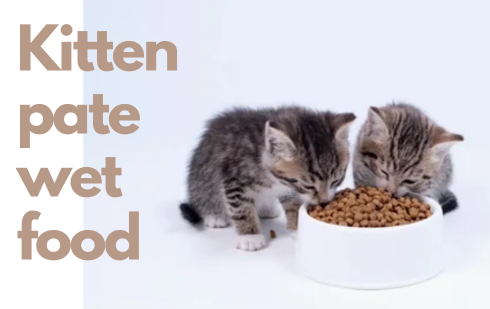Right Nutrition for Kittens: Kittens are considered one of the most critical development stages in kittens. Right feeding will determine whether they will grow up healthy and strong. It supports developing bones, muscles, the brain, and immune systems to ensure a long and healthy life. With a variety of products on the market, deciding the right food for the kitten becomes increasingly confusing. However, the knowledge of the nutritional requirement of kittens and choosing a formula to specifically answer their requirements is paramount in keeping them healthy.
Right Nutrition for Kittens: Understanding needs of kitten nutrition
Kittens need a diet to support rapid growth and development. They require more calories and nutrients than adult cats, which are relatively sedentary, for the high energy needs of their active developing bodies. Since cats are obligate carnivores, they cannot be satisfied by means of any plant-based foods or grain in significant amounts, so a high protein diet is the only suitable solution for them.
Key nutrients for kittens include protein, fats, vitamins, and minerals, which contribute to muscle building, bone density, the healthiness of the skin, and overall vitality. A food that is formulated just for kittens can guarantee that they get just the right amount of these key elements.
Protein: The Foundation of Growth
Protein is the mainstay of any kitten’s diet. Due to their obligate carnivorous nature, animal-based proteins should be the mainstay of a kitten’s nutrition. This is the building block of a kitten’s body, which needs them to develop the muscles, tissues, and organs in their body. Lack of protein in a kitten’s diet may result in muscle wasting, as the kitten’s body breaks down its own muscles, tissues, and organs to obtain the essential amino acids.
Importantly, amino acids are the building blocks of proteins. Taurine is an essential amino acid that contributes much to the kitten’s development process. It plays a vital role in heart conditions, in vision, and reproduction. Since it is only found in animal tissues, taurine plays a crucial role in the kitten’s diet. If the kitten will not have the right quantity of taurine, kittens can be left with fatal diseases such as heart condition and blindness.
Other commercial cat foods can also have carbohydrates and grains, although these should ideally be small portions of the diet for a kitten. Excessive amounts of carbs will actually cause digestive upset and lead to unhealthy weight gain. The diet must primarily center on animal protein for healthy growth and development.
How Carbohydrates Can Help in Kitten Diets
Not only are fats good sources of energy, but they are also essential to the health of a young kitten. Healthy fats are critical for the absorption of fat-soluble vitamins A, D, E, and K, which allow a kitten to see, maintain bones, and keep immunological system health. Fats are a source of energy for rapid growth development in the early months, too.
They also contribute to healthy skin and shiny coat as they provide the oils for healthy skin. Skin may become dry and flaky with a diet lacking in fats, making kittens more susceptible to infections.
Specifically, arachidonic acid and linoleic acid, two of the fatty acids, are also essential in kittens. Arachidonic acid is considered an important component for clotting of blood and proper development of skin, whereas linoleic acid assists the body in controlling the inflammatory response. Fats are important for proper development and especially in the first year of life.
Vitamins and Minerals: Building Strong Bones
Vitamins and minerals are essential for skeletal health and overall development. Calcium and phosphorus are especially important for bone formation and strength. A balanced ratio of these minerals, along with vitamin D, ensures proper skeletal density and reduces the risk of joint problems in later years.
Kittens also have other unique vitamins, like vitamin A, which supports their sight, and B vitamins, essential for energy metabolism and nervous system activity. Among these, thiamine and niacin are very important for normal growth and appetite. Including these vitamins and minerals in the diet of your kitten is essential to steer clear of developmental problems as well as sturdy bone, robust teeth, and muscles.
What to Avoid in a Kitten’s Diet
While it may be tempting to share your food with your kitten, certain human foods are harmful and should be avoided. Fish, such as tuna, can lead to a deficiency in thiamine, a crucial B vitamin for kittens. Dairy products, including milk, are also problematic for cats as they often cause diarrhea due to lactose intolerance. Moreover, raw meat and eggs pose a risk to kittens of encountering harmful bacteria, such as salmonella and E. coli, and biotin deficiency. Due to these dangers, it is therefore important to feed kittens only foods designed to satisfy their needs.
Selecting an Equilibrium Diet: Consult Specialists
It is important to select the right commercial product specifically for kittens when selecting food for your kitten. Always seek a commercial product that’s labeled “complete and balanced” because this ensures that it would meet all of your kitten’s nutritional needs. Avoid generic adult cat food, as it might lack the extra calories and nutrients needed by your kitten to grow.
Consult a veterinarian or animal nutritionist if you have any concerns about the diet of your kitten or if your kitten has special dietary needs on the basis of their breed or health. Over-supplementation can also be dangerous, so reliance should be placed on a balanced kitten food to provide all the necessary nutrients. Vitamins or minerals should not be supplemented to your kitten unless a professional advises it.
Invest in Your Kitten’s Future Health
Feeding your kitten a balanced, nutritious diet is one of the best investments you can make in their future health. Providing the right foods rich in protein, fats, vitamins, and minerals sets the stage for a healthy, happy cat. Choose a good-quality food for your kitten with all the nutritional needs supplied and consult your veterinarian to make certain that this baby is getting the best start in life. Being proactive will save you from having to make costly calls to the vet in the future and ensure that your kitten develops into a healthy adult cat.


